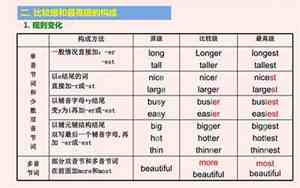strong比较级和最高级怎么写

"Strong"是一个形容词,用来描述力量、强度或坚定的性质。其比较级是"stronger",表示更强的或更有力的,而最高级形式是"strongest",意为最强的。例如:
He's very strong, but his brother is stronger than him. (他很强壮,但他的哥哥更强壮。)
After months of training, he became the strongest compe in the race. (经过几个月的训练,他成为了比赛中的最强者。)
英语中有一些形容词没有规则的比较级(如good, bad, many, few 等),但strong遵循规则,其比较级和最高级变化规则明了。
strong比较级最高级造句
1. 比较级造句:
Sarah is a strong swimmer, but her sister Jane is even stronger, always winning the races at the pool.
The oak tree was sturdy, but the sequoia was significantly stronger, able to withstand severe storms.
2. 最高级造句:
The weightlifter was the strongest person in the gym, lifting weights that seemed impossible for anyone else.
Among all the athletes, the marathon runner was the strongest, demonstrating remarkable endurance and speed.
在这些句子中,strong的比较级和最高级形式被用于描述人物的相对力量或能力,强调某人或某事物在某些方面比其他更强。
strong比较级为什么不双写
英语中,像"strong"这样的词(一般以一个元音字母结尾,后接一个辅音字母的重读闭音节),在变为比较级时通常不会双写该元音字母。规则是:直接加"-er"。所以,"strong"变成比较级是"stronger",而不是"stronger"。
有些情况是例外的,比如"good"变成"better","bad"变成"worse",尽管它们末尾没有辅音字母,但在变成比较级时会双写第一个字母。但这些规则并不适用于所有不以辅音字母结尾的词,"strong"就是这样遵循常规规则的词。
strong比较级最高级怎么写
"Strong"(强壮的)的比较级是"stronger",表示更强壮或更有力,最高级是"strongest",意为最强壮或最强的。下面是它们的写法:
比较级: If you lift weights, you might say, "I'm stronger than I was last year." 或 "The new training has made him a lot stronger."
最高级: In a competition, "He is the strongest athlete I've ever seen, always lifting more weight than anyone else." 或 "After months of practice, she became the strongest swimmer in the race."
记住,这些规则同样适用于其他一些词,如"hard"(硬的)变成"harder"、"best"变成"best"(最高级),但不是所有的词都遵循相同的规则。对于不规则的词,比如"good", "bad", "far" 等,它们的比较级会改变词根。


